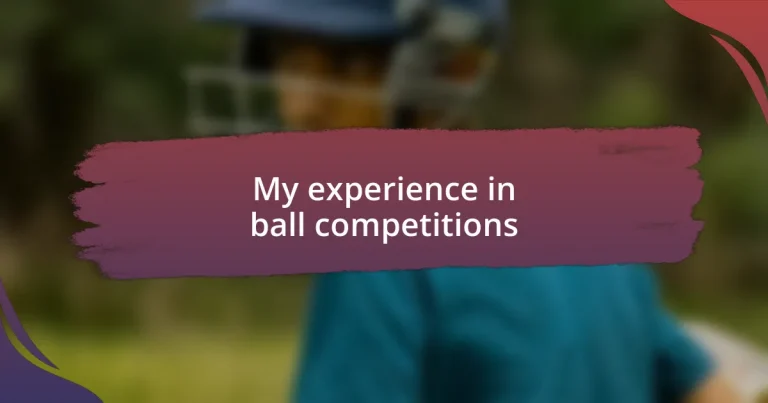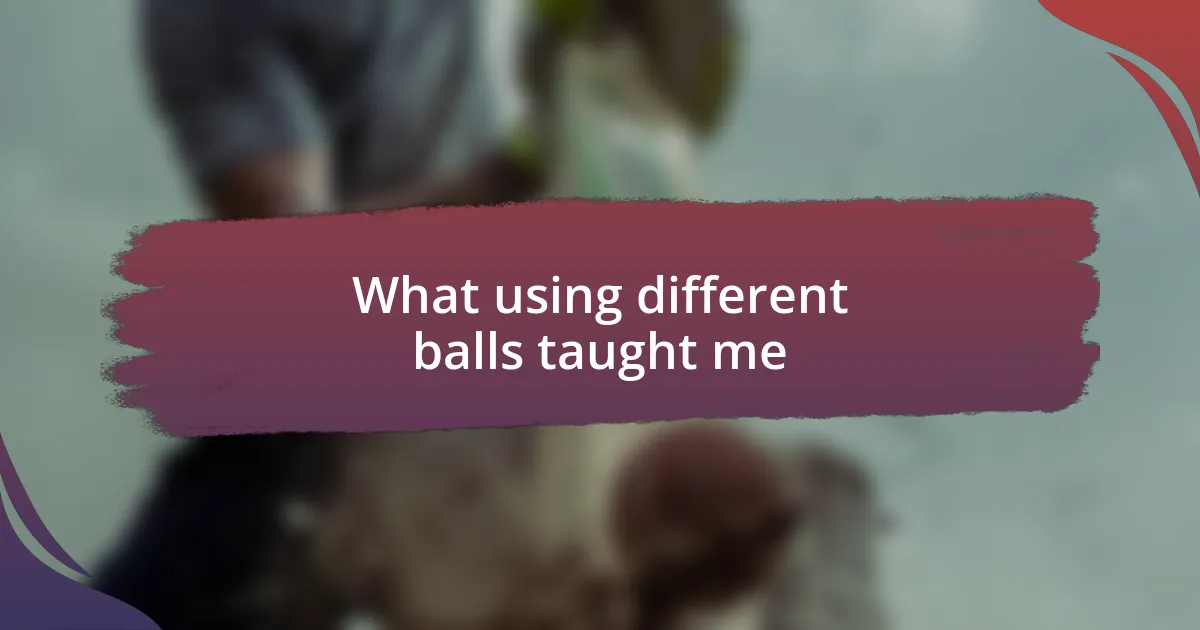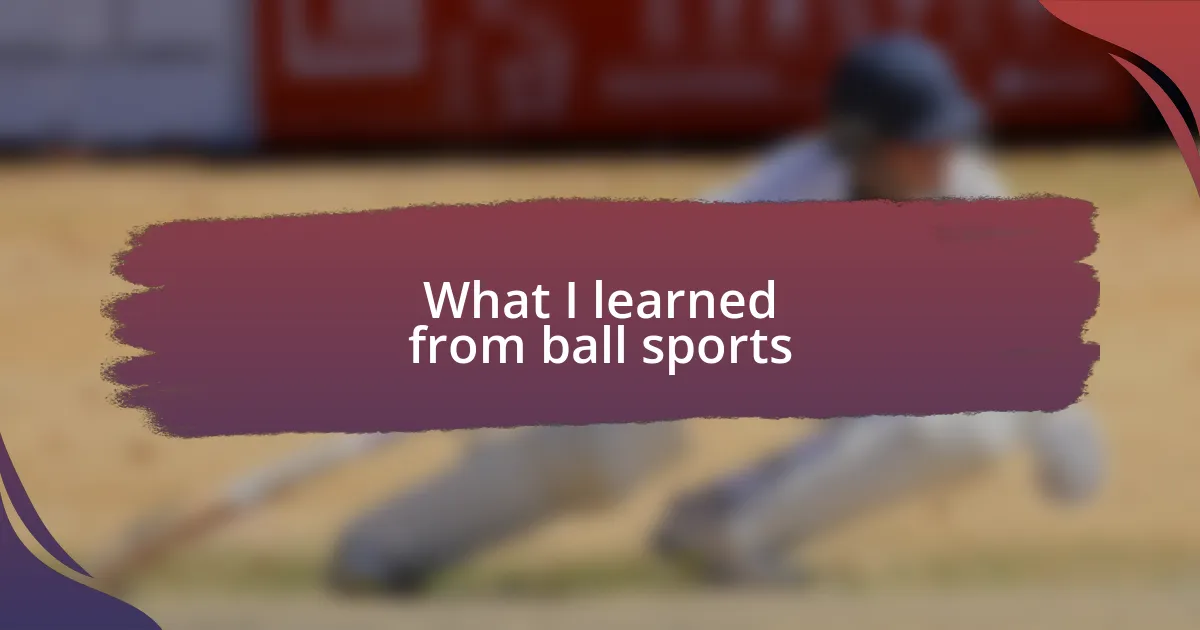Key takeaways:
- Ball competitions foster excitement and camaraderie through teamwork, resilience, and memorable experiences.
- Preparation is crucial, including consistent practice, understanding rules, and setting realistic goals.
- Analyzing performance post-competition, seeking feedback, and reflecting on emotions are essential for growth.
- A positive mindset and strong teamwork enhance individual and collective success in competitions.
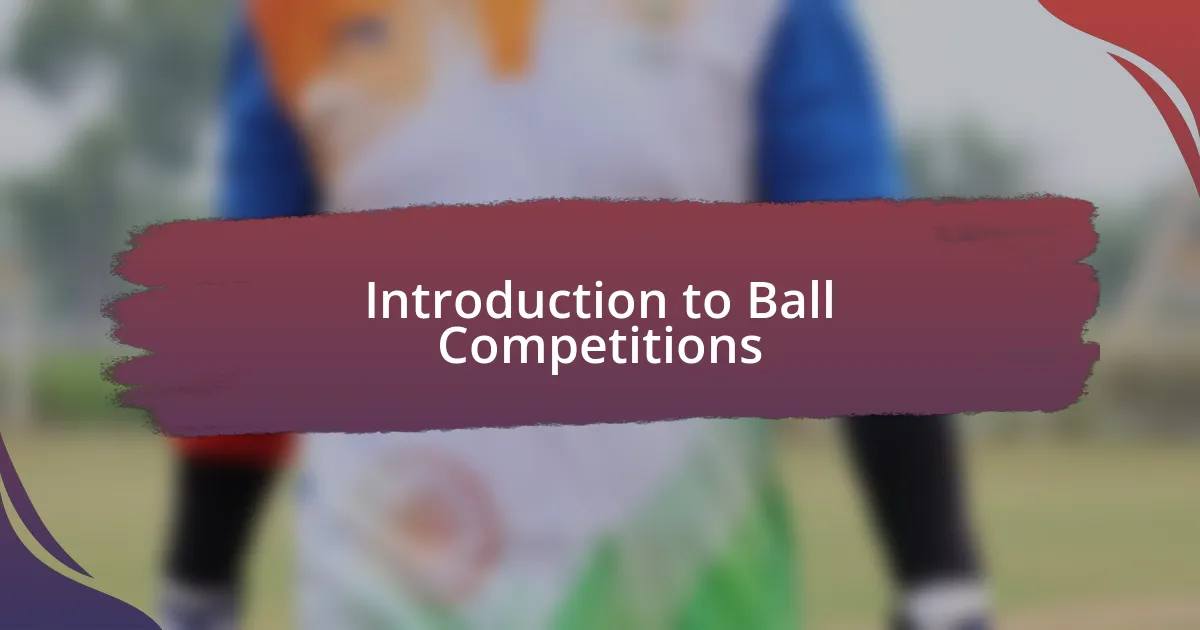
Introduction to Ball Competitions
Ball competitions, in all their energetic glory, have a unique way of drawing people together. I still remember the thrill of my first competition; the anticipation in the air was palpable, and I could feel my heart racing. It made me wonder, what is it about these events that stirs such excitement in all of us?
As I stepped onto the court, the buzz of the crowd intensified my focus, each cheer and chant echoing my own hopes and fears. For many, ball competitions are not just about winning trophies; they encapsulate teamwork, resilience, and the joy of playing a game we love. Have you ever thought about how a single moment in a match can spark friendships that last a lifetime?
In my experience, the beauty of ball competitions lies in their unpredictability. One moment, you may be in the lead, and the next, you could be fighting to catch up. This constant ebb and flow creates a memorable narrative that keeps players and spectators alike on the edge of their seats, reminding us all why we participate in the first place.
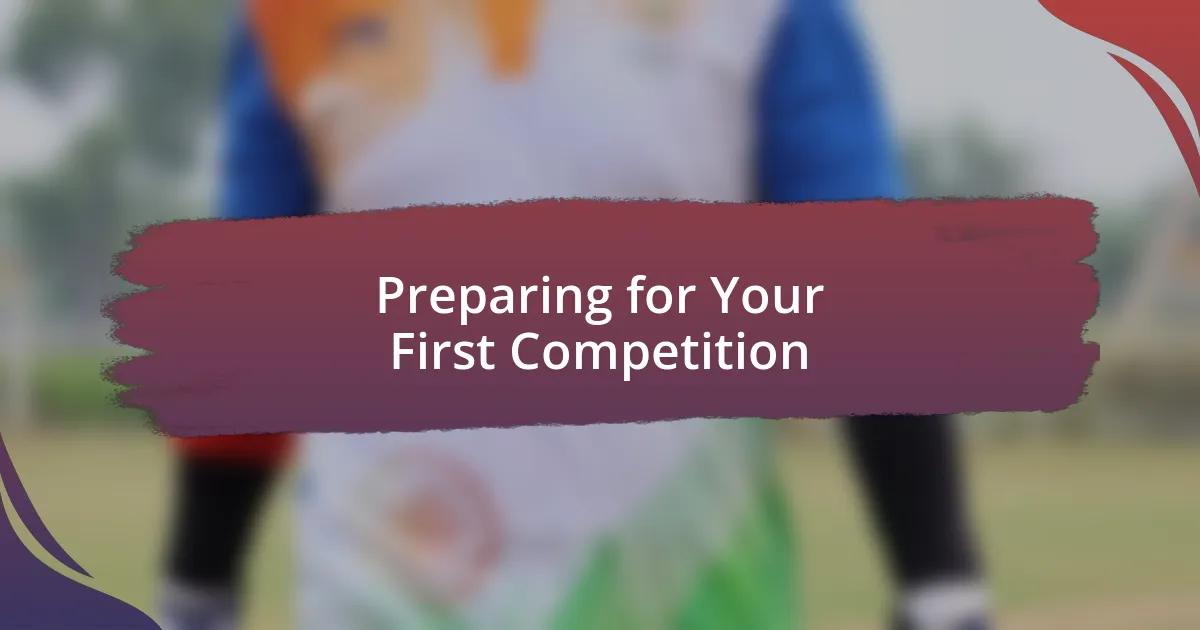
Preparing for Your First Competition
Preparing for your first competition can be both exhilarating and nerve-wracking. I vividly recall the flurry of emotions I felt leading up to my initial match. The key is to channel that excitement positively and focus on practical steps that can ease your nerves. Having a structured plan can make a profound difference in your confidence on the day of the event.
Here are some essential tips that worked for me:
- Practice Regularly: Consistent practice builds muscle memory and enhances your skills, which can calm your nerves during competition.
- Visualize Success: Picture yourself performing well. This mental rehearsal can boost your confidence and prepare you for the match.
- Gather Support: Surround yourself with teammates and friends who can encourage you. Their support often makes a world of difference.
- Set Realistic Goals: Establish achievable targets for your first competition. Whether it’s improving personal performance or simply enjoying the experience, having clear goals helps maintain focus.
- Prepare Physically and Mentally: Prioritize rest and nutrition in the days leading up to the match. A well-rested body and mind perform significantly better.
Taking these steps can transform your experience from sheer anxiety to a more manageable and enjoyable event, making your first competition memorable for all the right reasons.
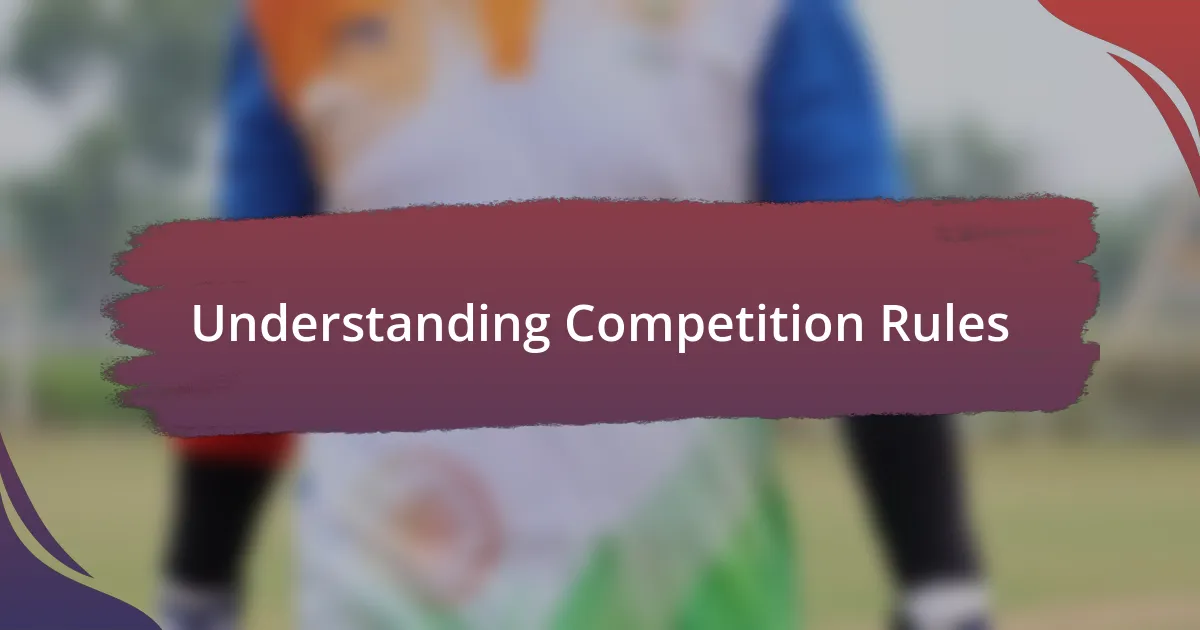
Understanding Competition Rules
Understanding competition rules is crucial for success in any ball competition. I remember feeling overwhelmed by the various regulations before my first tournament. Each rule seemed to pile on the pressure, but taking the time to understand them gave me clarity and an edge over my competitors.
It’s essential to familiarize yourself with the specific guidelines of the game you’re participating in. For instance, I learned that knowing the difference between minor and major infractions can impact a match’s outcome significantly. I once watched a teammate get penalized for a minor infraction simply because he didn’t know the rules well enough, and it was a tough lesson for all of us.
Additionally, reviewing the tournament format can provide strategic advantages. Understanding how scoring works, whether points are cumulative or not, can help you plan your moves. I often found myself adjusting my gameplay based on the scoring structure, which became an integral part of my strategy as my experience grew.
| Aspect | Importance |
|---|---|
| Knowing the Rules | Prevents penalties and enhances performance |
| Understanding Scoring | Guides strategic planning |
| Familiarizing with Format | Affects overall game approach |
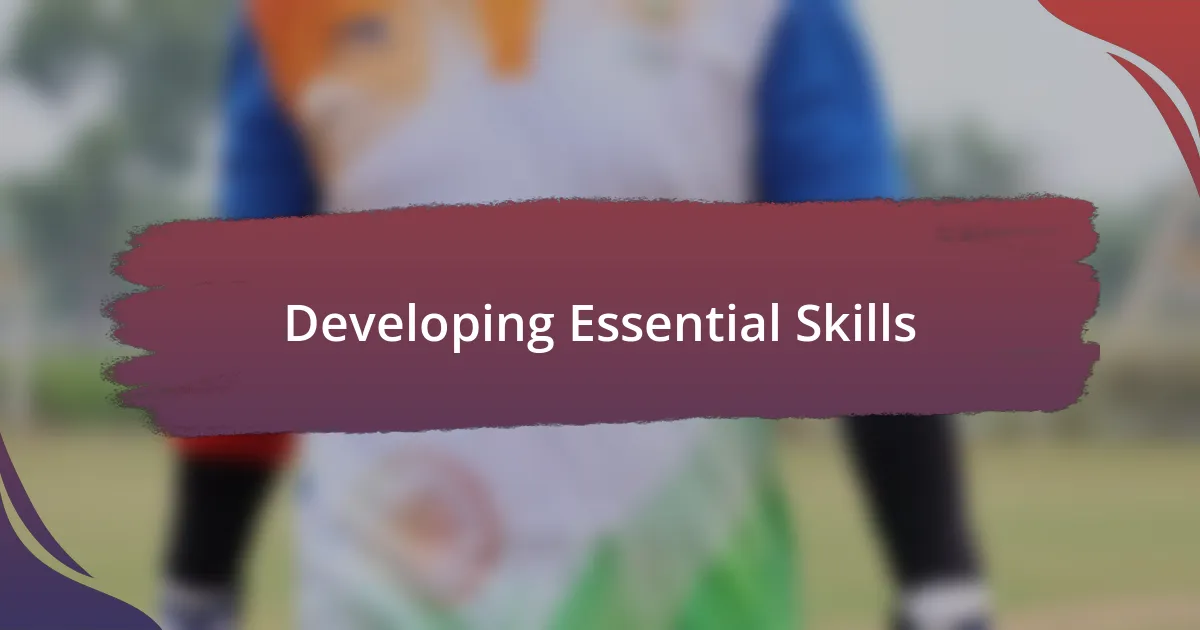
Developing Essential Skills
Developing essential skills goes beyond just physical ability; it also involves strategic thinking and adaptability. I vividly recall a match where I had to quickly adjust my tactics when my original plan fell apart. That moment taught me the importance of thinking on my feet and adapting to ever-changing conditions on the court.
Communication is another critical skill I honed throughout my experiences in ball competitions. In one game, I found myself struggling to coordinate with my teammates, and it cost us a crucial point. This realization pushed me to focus on clear and effective communication. By encouraging open dialogue, we were able to increase our teamwork and overall performance dramatically.
Lastly, mental resilience cannot be overlooked in the realm of competition. I remember sitting on the sidelines during a particularly tense match, feeling my anxiety levels rise as the game progressed. Developing strategies to manage stress, such as deep breathing and positive self-talk, helped me regain focus and contribute positively to my team. Have you ever experienced a similar moment when you had to overcome mental barriers? It’s those trials that shape us into better competitors.
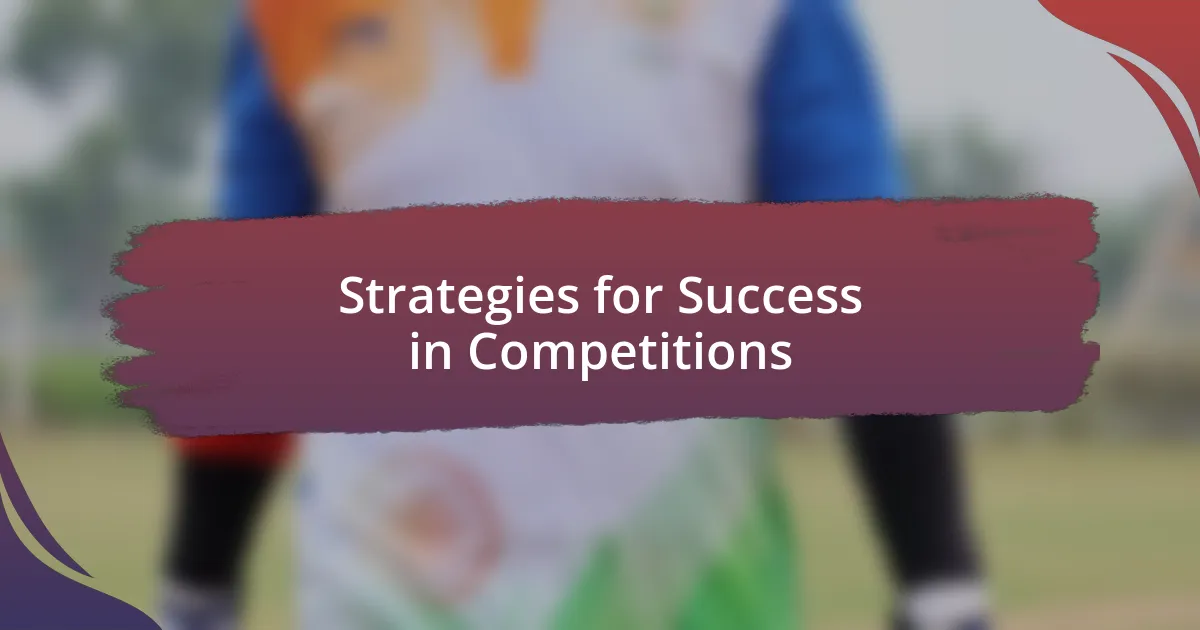
Strategies for Success in Competitions
One effective strategy for success in competitions is meticulous preparation. I remember a time when I spent weeks studying my opponents’ playing styles and tendencies, analyzing their strengths and weaknesses. This preparation not only boosted my confidence but also gave me an edge during the match; it felt like I was one step ahead, anticipating their moves. Have you ever put in that extra effort only to see it pay off when it mattered the most?
Another vital aspect is building a solid support network. During one particularly intense competition, I leaned heavily on my teammates for encouragement. Their unwavering belief in my abilities allowed me to trust myself even when I doubted. It’s remarkable how a few motivating words from others can shift your mindset. Have you ever relied on someone during a tough moment? That camaraderie can make all the difference.
Lastly, setting clear and achievable goals can keep focus sharp. I distinctly remember setting a personal goal to improve my first serve accuracy for a regional tournament. By breaking it down into smaller, manageable steps, I was able to track my progress and stay motivated throughout my training. Goals not only provide direction but also create benchmarks for celebrating small victories along the way. Have you set a goal that transformed your approach to competition? It’s these purposeful intentions that propel us forward.

Analyzing Performance After Events
Analyzing performance after events is a crucial step that often gets overlooked. I recall a time post-competition where I sat down with my performance stats and video footage. Watching my matches helped me identify patterns, both good and bad, that I hadn’t noticed in the heat of the moment. Have you ever found something surprising when reviewing your performance? It can be enlightening, to say the least.
Another aspect I find valuable is seeking feedback from trusted peers or coaches. Once, after a major tournament, my coach pointed out that I rushed my decision-making during key plays. Initially, that critique stung a little, but it ultimately opened my eyes to the importance of composure in competitive settings. Isn’t it fascinating how an outsider’s perspective can shine a light on areas for growth that we might be blind to?
Finally, I’ve learned to embrace the emotional side of reflection. After a hard-fought match, I take the time to sit with my feelings—whether it’s joy, disappointment, or frustration. I remember being crushed after a loss, but talking through those feelings with a friend helped me understand my drive to compete. Have you allowed yourself to feel those emotions? It’s these moments of vulnerability that often reveal the most about our true motivations and areas for improvement.
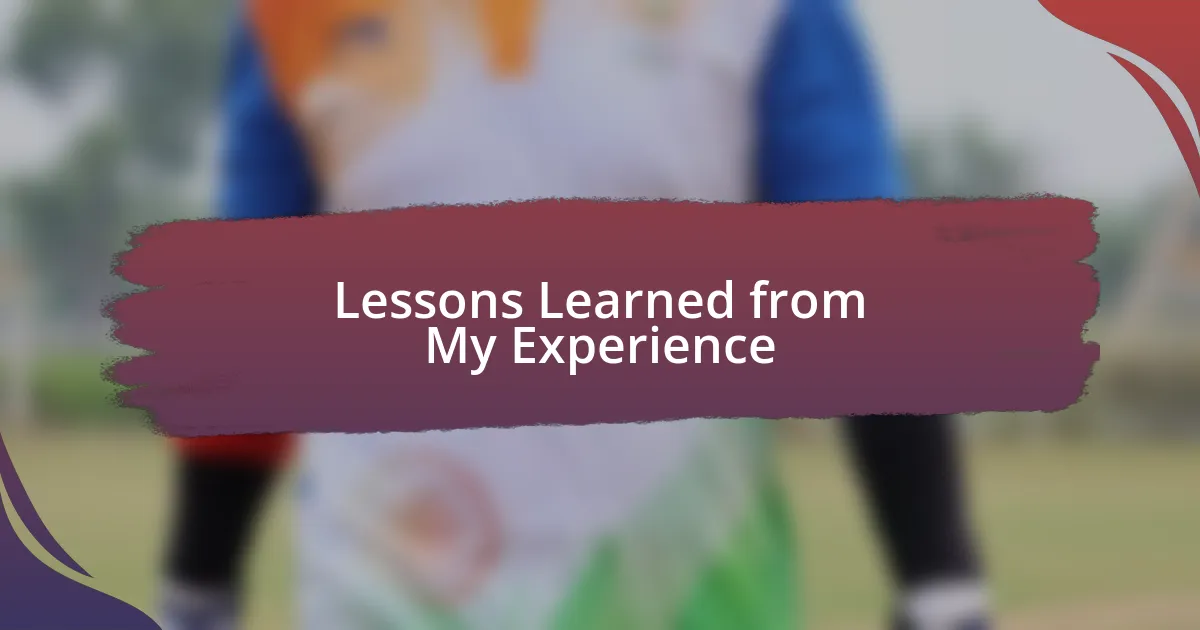
Lessons Learned from My Experience
Throughout my journey in ball competitions, one major lesson I’ve learned is the value of maintaining a positive mindset. At one tournament, despite missing a crucial shot early on, I chose to focus on the next play instead of dwelling on my mistake. This shift in perspective not only aided my performance but also reinforced the importance of resilience. Have you noticed how positivity can fuel progress, even in tough situations?
Another significant insight involves the power of preparation. I recall a time when I underestimated the competition and went into a match without fully preparing. My lack of readiness led to an early exit from the tournament, a humbling experience. That setback taught me to respect every opponent and approach each competition with the same rigor. Doesn’t it make you reflect on how preparation impacts your success?
Lastly, I discovered the strength of teamwork. There was a memorable event where my partner and I had to adapt our strategy on the fly. Through constant communication and trust, we improved as a duo and even made it to the finals. This highlighted for me that collaboration can elevate individual performances. How often do we realize that we’re stronger together than we are alone?
